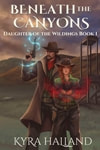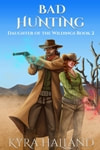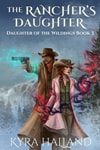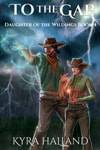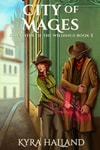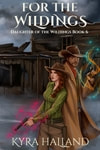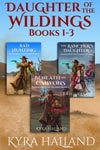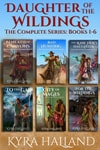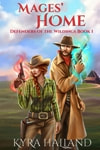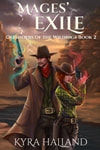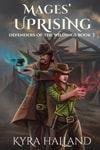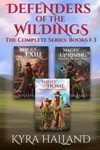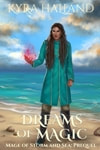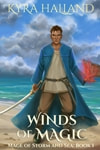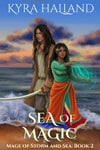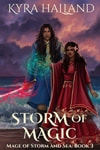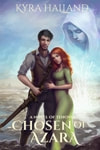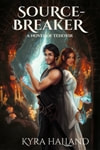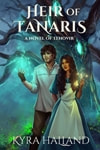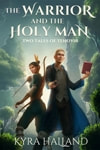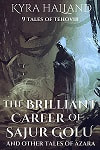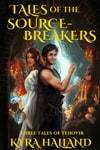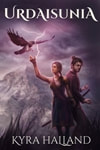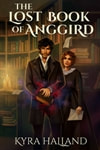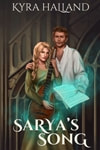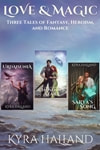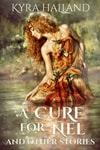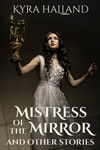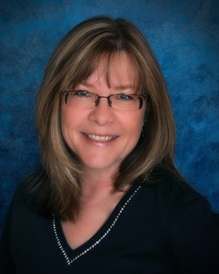 Today I'm very pleased to introduce you to Donna Hawk, as part of Donna's blog tour with Saskia Book Tours. Take it away, Donna! 1. Tell us a little about yourself. My name is Donna Hawk. I’ve been a middle school teacher for 33 years. I taught Reading, mostly, but also I’ve taught a variety of things: yearbook, photography, creative writing, social studies… the list seems endless. I truly enjoy that age kids. I retired two years ago because I wanted to devote time to writing. I live in a small town, on a farm with my husband, a dog, and a whole bunch of cows. I know everyone in town, so writing is a good way to escape! I am also an avid photographer. 2. When did you start writing, and why? I don’t remember liking or not liking to write as a child. I was pretty normal as far as my attitude toward school. In college, I became an avid reader. I often thought: I think I can do this, when I read a book I really liked. Between college and my boys leaving to go to college themselves, I wrote several full-length manuscripts, but for a long time never had the nerve to send them off to anyone. Sometimes I go back and reread them just to make myself laugh. The early ones were pretty awful. 3. What do you write? What do you like about writing it? At first, and this includes my old ones, I wrote mainly romances because that’s what I was used to reading. Recently, however, I discovered that because I was a teacher in a small town, I wasn’t comfortable saying too much that dealt with sex or anything too adult-related. I guess I cared what my middle schoolers would think. So I thought: why not write for them? My new trilogy is awesome for anyone 12 and up. Now I can sleep at night!! J (And I can let my mom read it!!) 4. What is your latest book? My latest book is called Where Darkness Walks; it is the first book of my Mortgatha Trilogy. I’m really happy with it. It’s the first truly Young Adult book I’ve written. I kept asking myself what I’d seen my students read. That’s what I wanted to write. 5. "Welcome To My Worlds": Tell us a little about the world of your latest book. The story begins in our Earth world, but soon Clarie finds herself being shoved against a set of dark, magic doors into the shadow realm of Mortgatha. In some ways, it’s very Earth-like, but there are a lot of scary things about it. Mortgatha has been taken over by the Darkness, which has done everything in its power to extinguish the Light. There are not only scary animals, but dark entities that pester her and try to take Clarie’s life. Many of the “bad guys” are not actual characters that she can see, but still try to hurt her and take the Light away from her. The sun is never bright, the stars are too timid to shine, the moon rarely appears. It’s like living in smog. 6. Introduce us to some of your characters. What do you like about them? The main character is Clarie Perl. She is sixteen and very sweet. I like her because she has a good relationship with her dad, she is loyal not only to the people she knows but also to the Earth world. Patrick is the main minor character. He picks Clarie up when she is dumped by her boyfriend and, like Clarie, is very loyal. He is romantically interested in Clarie. He bullies his way through the dark doors in an attempt to “rescue” her. The third main minor character is Joseph. He is a resident of Mortgatha, but is from the Earth world. He loves Clarie, to Patrick’s annoyance. 7. A fun fact you would like your readers to know about you or your book. Imagine what it would be like to own your very own flying carpet… I know I want one! 8. Blog/site link, and where your book is available. My book will be available on Amazon, Barnes & Nobel, Smashwords, iTunes, or wherever eBooks are sold, plus on some sites it will be offered in paperback. You will also be able to find it and link to it on my website: http://donnahawk.net/ EXTRA SUPER BONUS!! If you'd like a chance to win an ebook of Where Darkness Walks, leave a comment below. Everyone who comments by the end of the day (11:59 pm Pacific Daylight Time) today (May 31) will be entered into a drawing for a giveaway of one free copy of the book! 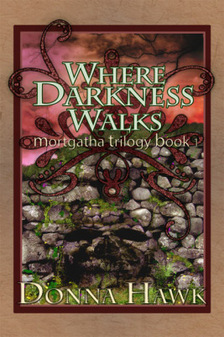 Where Darkness Walks (Mortgatha Trilogy Book 1) By Donna Hawk Clarie’s world is about to change for the darker. Rand broke up with her at the prom, she uncovers a secret in the hidden back of an armoire, and she meets Patrick, who is determined to help her forget her broken heart. As Clarie evades classmate Bulldog’s stalking, she and Patrick explore the dark halls of an abandoned cement plant. After following Clarie and Patrick deep inside the cement plant, Bulldog confronts Clarie as he fights with Patrick. When she is accidentally pushed against a set of dark doors into the shadow realm of Mortgatha, everything she fears is set into motion to keep her away from her beloved Earth world. Even with Patrick’s help, the doorway home moves randomly, evil characters beset them at every turn, and the way home seems farther away than ever. Where you can purchase this book: Paperback Createspace E-Book Amazon About Donna Hawk:
I have been a teacher in Kansas for 33 years. I enjoy writing, riding my bicycle, and spending time with my husband. I am an avid photographer and Photoshop user. Currently, I am working on a dark trilogy for young adults, the first of which I am hoping will be completed by the end of the summer 2013. If you have any questions for me, you can email me at: [email protected] Website Goodreads
10 Comments
Earlier this month, I got an email from an old college friend asking if my books are suitable for a couple of teenage girls in her life. I also had the opportunity to lend my proof copy of Urdaisunia to a good friend of mine, who also happens to be the wife of our current clergyman (in our church, the leaders of the congregation are drawn from the membership and rotated about every 5-7 years). These incidents, along with a discussion on my Goodreads group about content and age appropriateness got me thinking that I should do a post about content and age appropriateness of my books, as a guide for anyone who might be concerned about that.
To establish some context, I'll start by saying that when I was growing up, my parents told me that none of the books in the house were off-limits to me, and if I had any questions about anything I read I was welcome to bring it up with them. I think I was about 11 or 12 at the time. Of course, being the upright, church-going people that they are, my parents didn't have any pornography or anything like that in the house, but they did buy a regular supply of the current best-sellers, with all that entails. The first book I read with my newly-granted freedom (or maybe this was the book that inspired that conversation) was The Poseidon Adventure. The original movie had come out not long before, and the theme song from the movie was a big hit on Top 40 radio, so I was curious. Anyway, I grew up with the idea that, with proper parental involvement, teens should have few if any restrictions placed on what they read. Of course, now, erotica and books with very explicit sex scenes are a lot more mainstream than they used to be, and I wouldn't be wild about the idea of my own teens reading those. So I'll agree that parents, and anyone who doesn't care to read explicit material, need to exercise more caution now than maybe they used to. Sex isn't the only concern in deciding the appropriateness of reading material. Graphic violence is something that many parents and readers are concerned about; along with, at least for me, the cause served by the violence. I'm less bothered by reading about a villain being graphically and colorfully disposed of than I would be if the same methods were used against a hero, innocent bystander, child, or animal. Strong language bothers some people. Readers and parents might also object to what they consider sacrilegious content. A handful of f-bombs in a book doesn't bother me, but I've been known to put a book down because of light or disrespectful treatment of matters that are sacred to me. Some people might not like to see people of certain genders or races portrayed in certain ways. Some people might object to a specific political slant. The exact definition of what's offensive or inappropriate is different for everyone. As another example, I'm presently reading a fantasy novel that I believe is generally considered "clean," although it contains at least one fairly intense scene of near-rape, and I'm left wondering why near-rape is considered less objectionable than consummated lovemaking, just because the act isn't completed. Anyway, the list goes on and on, and the consensus among writers is that you can't please everyone, you're bound to end up offending someone, and the best and only thing a writer can do is to write as honestly as he/she can. So, to the point. How would I rate my books as far as age-appropriateness and offensive content? My books feature adult characters, with adult lives and concerns, and contain "mature themes and situations," including sex and relationships, earning a living, death, war, sacrifice, and the struggle against evil forces that disrupt their world. A principle I try to follow in my writing is that everything in the story is there because it's needed. (I'm not perfect at this, but it's what I aspire to.) The corollary to that is, if something needs to be in the story, I put it in. If some important story or character development requires a sex scene, I put in a sex scene, though I leave out any description that isn't important to the point I'm trying to make. However, if some detail of the act is important, I'll include that - but still in the least graphic manner that still gets the job done. My aim is never to titillate the reader - I don't want the reader to be pulled out of the story by thinking about their own reaction to what I've written, I want them to be engrossed in what's happening with the characters (this applies to everything I write, not just sex scenes). On the other hand, if the important character and story business take place before the sex scene, I'll draw the curtain. In Urdaisunia, we don't need to know what Prince Eruz does with his three concubines (no, seriously, we don't); what we need to know is the desperate state of mind he's in that drives him to seek comfort that way. Same thing with violence. Prince Eruz has to execute some people. The important thing is what's going on inside Eruz's head as he is forced to carry out these executions, not graphic descriptions of the actual deaths, so that's where the focus is in the writing. In Lost Book of Anggird, a couple of reprehensible people are killed in a particularly grisly way as punishment for their misdeeds; the act of carrying out the killings is cathartic to the person who does it, as well as demonstrating the extreme state of mind that character is in, so I focus on that in the writing and not on the (literally) gory details. Language: I try to use restraint in the use of strong or offensive language, because it loses its impact if it's overused. (A personal line for me is not to use religious oaths that apply in our world; on the other hand, characters in an invented world using oaths that reference invented gods aren't a problem for me.) Again, if it's necessary to communicate what the character is experiencing, or if the use of strong language is appropriate to how the character would speak in a given situation, I'll put in just what's necessary. There's a bit of language in Urdaisunia that's rougher than I would normally use, but it's coming from a thoroughly bad person who is purposely being as insulting and offensive as possible. Anything milder in that situation would have sounded silly. And so on. In general, I try to put in what the story requires to be told honestly and completely, without going overboard, and certainly without any intent to purposely shock, offend, or titillate. If you want something more concrete, here is where I rate my books on a couple of different scales: On the All-Romance Ebooks Heat Rating scale, from 1 - 5 flames, I rate my books a 2: "some [consummated] love scenes. These will be more sensual than graphic and will mostly rely on euphemism." Some parts might edge up just a bit to a low 3, with slightly more graphic description. My short stories run from 0 - 1 flame. Alternatively, here's a rating scale I devised for fanfiction (another post for another time): G: Nothing offensive, possibly some slight angst PG: Occasional mild language, sexual references, mild violence, angsty PG-13: More frequent language, strongly implied or "on-camera" (non-explicit) sex, more violence, intense angst R: Strong language, more descriptive (but still non-explicit) sex, semi-graphic violence M: extreme foul language, explicit sexual description, graphic violence. On this scale, my books run PG-13 - R. (Short stories G - PG-13). As far as age recommendations go, my books are definitely not for children. Also not for young teens. As far as older teens go, my books don't fit into the currently-popular Young Adult category, mainly because they have adult rather than teenage main characters and address adult concerns rather than the typical coming-of-age themes usually addressed in YA books, and also may have somewhat more graphic content (though my understanding is that there are plenty of YA books with intense and disturbing content, that address serious issues of sex, drugs, abuse, and so on). Based on my own experience at that age - there wasn't a YA category back then, or if there was it wasn't nearly as prevalent as it is now, and when you were in high school you went from reading middle grade/young teen books to adult books - I think my books are suitable for ages 16 and up. I wouldn't have a problem with my 17-year-old reading them (aside from the embarrassment factor of kid reading love scenes written by his mom!) I mean, really, I'm not exactly writing 50 Shades here. But, ultimately, the appropriateness of my books is not a decision I'm qualified to make for other parents - or any other reader, period. I hope the information in this post will give readers and parents the information they need to make the right decision for themselves. Last week I had the opportunity to speak to three wonderful artists who I found on deviantArt.com about commissioning cover art for Daughter of the Wildings. I was very pleasantly surprised with what I was able to afford, with the end result being that not only am I able to get custom cover art for the Daughter of the Wildings series, I can also get a better cover than the one I made myself for Chosen of Azara! I'm not going to go into which artist/s I ended up commissioning (that'll be revealed when I post the covers) or why (that's between me and them, except it was a very difficult decision and a lot of it came down to the looks I wanted for the different projects and the needs of my budget) or how much I'm paying (that's confidential), but I will say that based on my interactions with them so far, I would absolutely recommend any of the three to other writers who are looking for cover artists.
Go take a look: me-illuminated Trisste Design by Katt Also, some authors I read have some new stuff out. The fabulous Camille LaGuire, whose Mick and Casey westerns I really enjoy, is posting a new serial, The Case of the Misplaced Baronness. This one is set in her roughly "silent-movie era" alternate universe and features the indomitable Lady Pauline Anne Marie Tritt-Woolsey Beethingham Smythe, Baroness of Beethingham, aka "Plink." There's something of a Jeeves-and-Woosterish vibe to this, so if you're a Jeeves and Wooster fan (which I am), you'll enjoy this. And Forged in Blood, Part 1, the first part of Book 6 of the Emperor's Edge series by Lindsay Buroker is out. I've really been enjoying this series, and could hardly wait for this book (and can hardly wait for part 2, due out later this summer). Each book is partly in the point of view of a different member of the Emperor's Edge team, and in this last book (or pair of books) we finally get inside the head of Sicarius, the inscrutable yet sexy assassin. And it's a very interesting place to be, indeed. I'm an incurable end-peeker (it's harder to peek at the end with e-books, which I don't know if that's a good thing or a bad thing, but I still manage it if I really can't stand the suspense) and it looks like this one ends with a doozy of a cliffhanger. Just makes the anticipation of the last book all the more sweet! I've also enjoyed the Encrypted/Decrypted duology set in the same world as the Emperor's Edge books. Finally, I want to mention The Norothian Cycle, by M. Edward McNally, yet another amazing independent author. I read the first book, The Sable City, not long ago, and went through it like a box of chocolates. Highly recommended, and I can't wait to read the rest of the series - after I finish Forged in Blood 1 and some Read and Review books for my Goodreads group. Since I started exploring books by independent writers a little more than a year and a half ago (about the time I was considering taking the leap into self-publishing myself), my to-read list, as evidenced by the number of samples on my Kindle, has been growing at an alarming rate. So many fresh voices and exciting books, so little time! One more thing: Here's a shout-out to this week's Paranormal, Fantasy, Dystopia, and Romance Writers and Reviewers group featured author, Donna Hawk! I will be hosting Donna next week as part of her blog tour with Saskia Book Tours, and I'm looking forward to it very much. 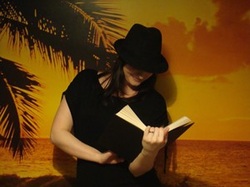 Today I'd like to introduce you to Sharon Stevenson, author of the Gallows series. 1. Tell us a little about yourself. I'm married to a man who makes me laugh. I love reading and watching TV and I enjoy a wide variety of genres for both. 2. When did you start writing, and why? I was maybe five years old when I started writing and I did it because I liked it. I think it started with weekend diaries at school. Whatever I'd actually done wasn't as interesting as what I could make up! 3. What do you write, and why? What do you enjoy about what you write? I write adult modern fantasy, or urban fantasy in a non-urban setting. Urban Fantasy is a favourite genre of mine to read so writing this type of series came easily enough! I like books to be entertaining and my imagination gets to run wild in a fantasy setting. 4. What is your latest book? Any forthcoming books? 'Fate Fallen', the third book in my Gallows series, just came out at the start of May. I'm in the editing stages with an urban fantasy / dark comedy novella about reanimation, titled 'Raised'. I hope to release it in the next few months. 5. "Welcome To My Worlds": Tell us a little about the world of your latest book. The Gallows novels are set in an alternate reality Scotland, complete with fictional towns and as many supernatural creatures as I could cram in! Descendants of fallen angels work as demon trackers and demons roam the earth in the form of vampires. 6. Introduce us to some of your characters. What do you like about them? Shaun is sarcastic, a bit moody, and reluctant but his heart's in the right place. Sarah is a pretty determined and caring kind of person even if she tends towards reckless behaviour. I enjoy flawed characters so that's the kind I like to write about! 7. A fun fact you would like your readers to know about you or your book. I tend to listen to music while I write. I listened to Twin Atlantic CD's while I was writing the Gallows novels. 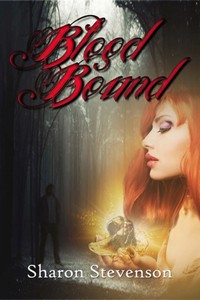 8. Blog/site link, and where your book is available. Website http://www.sharonstevenson.moonfruit.com/ Link http://www.amazon.com/dp/B009JBKV96 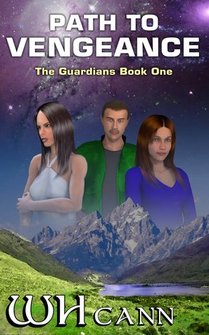 Path to Vengeance (Guardians, Book 1) by W.H. Cann Kyra's star ratings: Story: * * * * Characters: * * * * Writing mechanics: * * * Worldbuilding: * * * * * Science fantasy, futuristic fantasy, whatever you want to call it, if you like magic and high tech together, you'll enjoy this. Sorcerers and ancient prophecies, whiz-bang hardware and space battles, and a human story of love, loss, ambition, friendship, and vengeance all come together in this story about Grogaan, a talented young starfighter pilot. We follow Grogaan as he deals with the loss of three of the most important people in his life, including his beloved fiancee Miranda, through his search for vengeance against the raiders who killed them, and then as he begins to realize he has an even greater destiny. The style is somewhat formal, and the book is written in the omniscient viewpoint (that is, a distant, all-knowing narrator) rather than the more familiar 3rd-person limited (the story being told from inside the viewpoint of one character at a time). This is a legitimate stylistic choice, but some readers might find it makes it harder for them to become engaged in the book. To these readers I'd say, stick with it, it gets easier. Also, there's quite a bit of explanation of characters' thoughts, emotions, and motivations, as well as information about the (well-developed) world. The author is adept enough at using action and dialogue to show what we need to know about the world and the characters' thoughts and emotions that a lot of the additional explanation isn't necessary. Even so, the story moves forward at a good pace. The space battles are particularly well-written; I was able to clearly visualize the action, and found myself reading quickly to find out if Grogaan and his friends made it through safely. Overall, this is a fun, exciting book, and I understand that the next books in the series are even better, so I look forward to reading them. 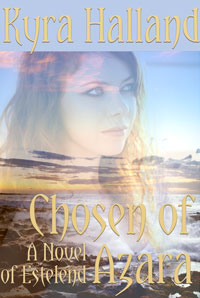 Here's another Book Extra for Chosen of Azara: the cast of characters. It's a little tricky to do a character list for this book in a non-spoilery fashion. The novel covers three distinct story arcs, over separate periods of time. Some characters appear in all three arcs, sometimes under different names, and other characters come and go. There are also some family relationships that might constitute spoilers. So instead of listing the characters by story arc, I've just put them by nationality, without spoilery family trees and alternate names. Also, here's a shout-out to the Paranormal, Fantasy, Dystopia, and Romance Writers and Reviewers group featured author of the week, Alexandra Butcher! The feedback from the test readers on The Lost Book of Anggird is in, and it's awesome. Lots of love for the book, and also some good suggestions for making it even better. So I'm mulling all that over, and in the meantime I'm going full-in on finishing up revisions on Chosen of Azara and getting it ready for release in June.
Chosen of Azara is set in a world that I started making up years ago. I don't remember how long ago, and I don't think Chosen is even the first story I set in that world. "A Cure for Nel," one of the stories in the collection of the same name, is set in the same world, as are the two longer short stories I wrote in March and some other unfinished novels/story fragments. I do remember how I started developing this world. I was bored one day, so I bought a box of crayons, the box with 64 different colors and a built-in sharpener. You can buy boxes with even more colors than that now, but at the time that was the deluxe box. Then I got out a big piece of cheap kid's drawing paper and started drawing this landmass. I wanted it to have deserts and hills and mountains and rivers and swampy areas and a large inland sea and all kinds of cool stuff. Mostly, I designed it around Sources, which I imagined as natural features that served as sources of magical power. A Source can be a hill or mountain, a cave, a place where two rivers flow together, a water spout or rocky ocean cove, an ancient tree, a spring or lake, a fjord, or any other kind of distinctive natural feature. And I named it SourceWorld. Which is descriptive, but not very organic - that is, it doesn't sound like something that the people living there would naturally call it. It's an externally-imposed name. So I got out my word-making-up-fu (checked the word-origins section of my huge old American Heritage dictionary and mixed some stuff from that together with some names I came up with on a fantasy name generator) and ta-daa, Estelend was born. The idea with magic in Estelend is that naturally-occuring heavenly and earthly magical powers are combined and flow through the Sources. Where the Source is, what kind of natural feature it's located in, and what sort of people gravitate to that Source all affect the kind of power it is, good, not so good, useful for healing or prophecy or other stuff, and so on. Certain people are born with an ability to take in Source-power and use it. Other people who aren't born with the ability can have it forced into them. A very few people are born perfectly attuned to the power of a certain Source, and their lives depend on having constant access to power from that Source. Bringing together a person and a Source that are incompatible, or committing certain acts within a Source (such as bloodshed) can taint or even destroy the Source. So I started marking in the Sources, and the countries, and figuring out allies and enemies and the different characteristics of the people and places on this huge continent, and how the magic works, and stories started to grow. I don't know if you can really call them a series, since they are all stand-alone, with different characters in different places, but they definitely go together. Chosen of Azara was posted on an old website I had for many years, and now I'm excited to be able to write and share more of the stories that my world of Estelend has given birth to. (Kanyev the Source-Fixer has been waiting impatiently for his day in the sun for a long time now. I promise, buddy, your time is coming.) There's a quick introduction to the world of Chosen of Azara, "A Cure for Nel," the tales of Haveshi Yellowcrow and Latan the Scholar, and more. Oh, and if you have a fantasy world, you have to have a map, and here it is. This is an improved drawing I did based on the original, and doctored up in the image editing program I had two computers ago. I don't seem to have the dingbat any more that I was using to mark cities, so as I add more cities I guess I'll have to find something else to mark them with. But that's ok. Better to have a world that continues to grow and develop than to have it become static for lack of a dingbat. 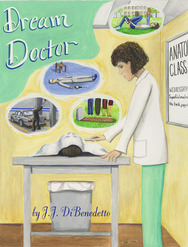 Dream Doctor (Dreams #2), by J.J. DiBenedetto Kyra's star ratings: Characters: * * * * Story: * * * * Writing: * * * * Suspense: * * * * Another wonderful installment in the "Dream" series. In "Dream Doctor," Book 2 of the series, Sara and Brian are newlyweds and Sara is beginning medical school, after a long recovery from the trauma of her previous experience of being inside a serial killer's dreams and racing to catch the killer. Now the dreams have come back, and this time Sara realizes that one of her professors is being threatened. The question is, who is trying to kill him? Or rather, who ISN'T interested in seeing him dead? In the first book, "Dream Student," I was a little confused by the balance between the school, romance, and mystery storylines; I wasn't quite sure which of those the book was mainly supposed to be. In "Dream Doctor," either the balance between school, relationships, and mystery has been adjusted a little, or I was just better prepared for the genre-crossing. In any case, I found myself equally drawn in by all three story lines: Will Sara and her classmates survive their first months of med school? Will Sara and Brian's marriage survive crazy schedules and the new people they're meeting? Will Sara's professor survive the attempt on his life? On all counts, the book comes to an emotionally satisfying conclusion. The writing style is smooth and assured, and the characters and their world are drawn clearly and vividly. I'm enjoying the "Dream" series very much, and look forward to reading the next installment, "Dream Child." I mentioned before (on my blog, and in comments on a couple of other blogs) that I have Chronic Fatigue Syndrome. I've had it for nearly six years now, and finally, after years of doctors dancing around the subject and not knowing what was wrong with me (I knew; it was obvious; you look up Chronic Fatigue Syndrome on any website dedicated to the subject and I'm a textbook case) I got a diagnosis a year ago. As much as you can get a definitive diagnosis for this: they take a complete history, take down all of your symptoms, do all the tests to rule out anything else that could be causing the fatigue and other symptoms, then if your history and symptoms are consistent with Chronic Fatigue Syndrome and they can't find anything else going on, then you most likely have CFS. It's a frustrating condition; there's no definitive medical test, no effective medical treatment, no cure. And a lot of doctors don't really even believe it exists. I've dealt with that way more than I should have to, and before I start ranting, I'll just move on with this post.
The only thing you can really do about CFS is to manage it with lifestyle management techniques. I was going to call this post "Living and Writing with CFS," but I still haven't got the "living" part down yet. I do have a program I'm supposed to be following - Mediterranean diet for its anti-inflammatory properties (I hate fish :( ), carefully managed exercise (with CFS, more exercise does not give you more energy; more exercise leaves you unable to get out of bed for a week), plenty of bed rest, supplements recommended by my doctor, and some other things I want to try. But it's hard to follow a program when you're stumbling around in a fog of exhaustion all the time, so I've got a lot of work to do on that. I'm not the person to be giving other people advice on living with and managing CFS. What this post IS about is writing with CFS. Someone who saw my comment on CFS and productivity on another blog (Dean Wesley Smith's, I think) wrote to me and asked if I'd written about my difficulties with being productive while having CFS. I hadn't, but I am now. The thing is, I've been pleasantly surprised by how productive I'm able to be considering my condition. The thing about CFS is it doesn't just cause physical fatigue. It also causes, among myriad other symptoms, mental fatigue, known as "brain fog." Memory problems, confusion, and difficulty concentrating are all part of this. Which, as you can imagine, makes any sort of sustained mental/intellectual work kind of difficult. But for a long time now, I've been able to maintain a writing schedule of about two hours a day nearly every day, which, considering the levels of exhaustion I have, is pretty good. And in recent months, I've seen that time creeping up to three hours a day. Not that I've been feeling better overall - I haven't - but I seem to have fallen into some habits that have helped increase my productivity. When I got that question last week, I started thinking about how I've managed to become more productive in spite of CFS, and came up with some ideas. 1. It really helps to break my writing hours up into smaller chunks of time, maybe 30-45 minutes or so, instead of working for two hours straight. As with physical activity, I've found that working in shorter periods of time and then taking a break actually allows me to be active a greater total number of hours. Also, find the times of day that work best for you, and protect these times as much as possible. 2. Find the writing process that works easiest and most naturally for you. Planner? Not a planner? Some of each? Write straight through or edit as you go? Writing software (another post for another time), Word, pen and paper? Concentrate on one project at a time or have a couple of different things you're working on? Whatever comes most easily to you, whatever makes you not have to burn energy fighting to follow the process, is the way you should write, no matter what way anyone else says is best. And be willing to change your process as you feel you need to, and as your current project demands. 3. Find ways to streamline the writing/editing process. Again, this is personal, but if you're going to produce books on any kind of schedule, you don't want to be taking a year or two to write a novel and another year or two to revise and edit it. Figure out the writing process that will help you get words written on a regular basis, and then if you revise and edit (some people don't; some people do their editing the first time around), find ways to cut down on the number of editing passes you need, which will cut revising/editing time from many months to a lot fewer months. I've recommended this before, and I will again: Holly Lisle's How To Revise Your Novel course is a great approach to adressing the major issues in your manuscript in one go and and getting that book out the door a lot faster. Don't "polish till it gleams" as the saying goes; this takes forever and has the tendency to strip away everything that's interesting and unique and YOU about the book. And don't go twenty rounds with your critique group on it, because then you end up with THEIR book written by committee (bleh) instead of YOUR book. My general philosophy on making shorter work of revising and editing is don't revise the story to death, and don't waste time revising to other people's rules or ideas of what your story should be. Get it good and get it out the door, and get to work on the next one. 4. Know when to call it quits for the day. There comes a time when the brain fog is thickening and most of what's coming out on the page (or the screen) is blathering. You're not doing any good, so even if you still have words or pages or time left to go on your daily quota, pack it in and get some rest. (This is also a REALLY GOOD TIME to get off the Internet, before you embarrass yourself. Which I sometimes have trouble remembering :-P) 5. Take care of yourself in general. Do what you can to follow your management program, if you have one. Get that few minutes of exercise. Get enough bed rest. Sleep is a big problem with CFS. A lot of time you don't sleep well, and even if you do, you wake up feeling like you didn't sleep at all. But being in bed resting is still better than being up, even if you can't sleep. I do best with ten hours a night of bed rest, whether I'm asleep or lying in bed reading. To figure out how much bed rest you need, go to bed at night then don't get up in the morning until you can do so without feeling like you're dragging a mountain out of bed with you. See how many hours that was; if you can do that every night, it does help. I also feel better if I'm eating a high fiber, fresh, fairly light diet and am careful not to overeat. (Another big IF; with so little energy, it's hard to cook like that on a daily basis.) 6. Stress burns a lot of energy, so find ways to manage stress. Meditation, or just letting your mind go blank while you listen to relaxing music; I've heard the yoga and tai chi are good but haven't tried them (mean to, just haven't gotten the spark of energy to try something new and different), eliminate unnecessary stress. Especially, don't spend energy comparing yourself and your productivity levels to other writers, and don't spend energy trying to do things that don't work for you. Find what works best for you, and be grateful you can do anything at all, because there's always someone even worse off. So, how productive am I, doing (or trying to do) these things? Well, since last November I've written one full-length novel draft, two novellas, two longer short stories, and three short-shorts. I finished editing and released one novel and one short story collection for sale, have another novel coming up for release in June, am working on edits on a novel that will hopefully be ready for release in October or thereabouts, and have also been getting the short stories edited and ready to post and release for sale. So, basically, I've increased my writing inventory by somewhere upwards of 140,000 words in the last six months and will have released 5 works for sale this year (3 novels and 2 short story collections.) So, not bad, not on the level of some really prolific authors, but enough to be able to start making a career of this. If you can do more than this, awesome. If you can't do this much, that's fine too. Do the best you can, and take satisfaction in knowing that you're doing the best you can, which is all any of us can do and a lot more than a lot of people ever do. 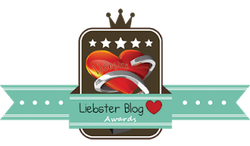 In the comments on my last post, Chris Kelworth nominated me for a Liebster award! This is a just-for-fun award, a way to highlight some favorite blogs and bloggers and show them a little love. Here's how it works: I answer 11 questions from the person who tagged me I share 11 facts about me I pass the Liebster on to 11 favorite blogs I come up with 11 new questions for my nominees to answer. Here are the questions Chris sent me: What's your most annoying habit? Popping my knuckles, or fiddling with my hair. Or leaving the cat food out. Or... Are you more of a planner, or a spontaneous person? Planner. I don't do well when unexpected things come up or I don't know what to expect. Are you organized or messy? On the spectrum, I'm more on the messy side, but I'm slowly trying to work my way towards the organized side. Who's the best character you've ever written and why? All of them :-D I can't pick favorites, it's like picking my favorite of my kids. But lately Professor Roric Rossony has been getting a lot of love from the test readers for The Lost Book of Anggird. He's a very interesting, complicated character, with lots more to him than meets the eye at first - in fact, his reality is very different from the appearance he puts up. If you had one day left to live, what's one thing you'd want to spend that time on? I'd split it between writing and spiritual devotions, with my family around me the whole time. Who is the most important person in your life? God, and my husband and kids. Are you working on anything writing-wise at the moment, or taking a post-Camp break? Always writing - right now I'm working on revisions/edits to two different novels, with a couple of short stories also waiting to be edited. What catchphrase do you say often in conversation? Don't know about a specific catchphrase, but I do tend to repeat myself a lot, which annoys me and the people I'm talking to. Out of your favourite fictional characters, who'd make the best sneaky ninja? My characters? or other characters that I like? Out of my characters, I'm not sure that sneakiness is a strong point for any of them. Probably Silas Vendine, though if he gets annoyed with the person he's stalking he'd give his cover away by cussing them out. For other characters, I'd have to say Himura Kenshin, from Rurouni Kenshin. He's already a sneaky samurai, which is just one step away from sneaky ninja. Where are your backup files? On a portable external hard drive, a couple of thumb drives, and on Sugar Sync, Dropbox, and Google Drive. Do you believe in true love? Yes :) I write about it, and I'm fortunate to have that in my marriage. 11 facts about me: 1. I had sour cream green chili chicken enchiladas for lunch. 2. My favorite color is purple. 3. Right now I'm reading three different novels. 4. I have two cats. 5. I'm 5'2" tall. 6. My kids were born seven years minus one day apart. 7. I lived in Germany for a year when I was eight and again when I was sixteen. 8. I have a Master's degree in Music History. 9. When I was little, my favorite babysitter's name was Kathy. 10. I used to play the recorder. 11. I've never watched Oprah. I'll tag: 1. W.H. Cann 2. Jennifer Howard 3. Sharon Stevenson 4. J.J. DiBenedetto 5. Kristen DaRay 6. Aoife Marie Sheridan 7. Robin Leigh Morgan 8. Nadege Richards 9. Maddy Barone 10.Tara Elizabeth 11.Nikki Broadwell If anyone else wants to jump in and play, feel free to! My questions for them: 1. What's your favorite book? 2. What's the latest book you've read? 3. What did you have for breakfast? 4. Chocolate, vanilla, or strawberry, or none (or all) of the above? 5. Where would you go on your dream vacation? 6. What was your favorite subject in school? 7. The zombie apocolaypse is here, and you grab the object immediately to your left to use to defend yourself. What is it? 8. Night owl or morning person? 9. Who is your favorite villain (from your own characters or other people's characters)? 10. What do you do when you aren't reading or writing? 11. What's your computer wallpaper? |
AuthorI am Kyra Halland, author of tales of fantasy, heroism, and romance. Sign up for my email list
My Books
More Books
Click on the covers for more information
Categories
All
Archives
April 2024
Kyra Halland: Welcome to My Worlds is a participant in the Amazon Services LLC Associates Program, an affiliate advertising program designed to provide a means for sites to earn advertising fees by advertising and linking to amazon.com.
Other links on this site may also lead to products for which the owner may receive compensation. This website uses marketing and tracking technologies. Opting out of this will opt you out of all cookies, except for those needed to run the website. Note that some products may not work as well without tracking cookies. Opt Out of Cookies |
 RSS Feed
RSS Feed
